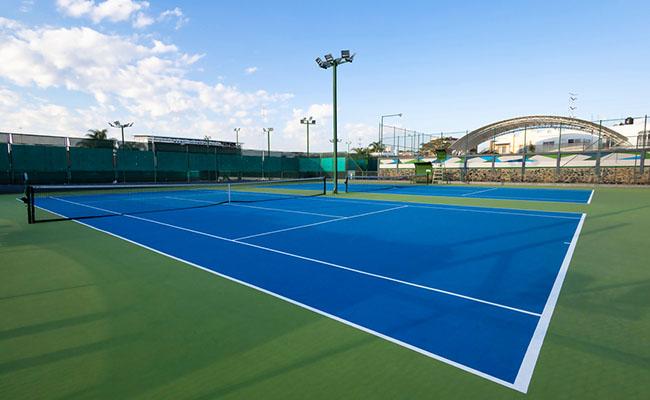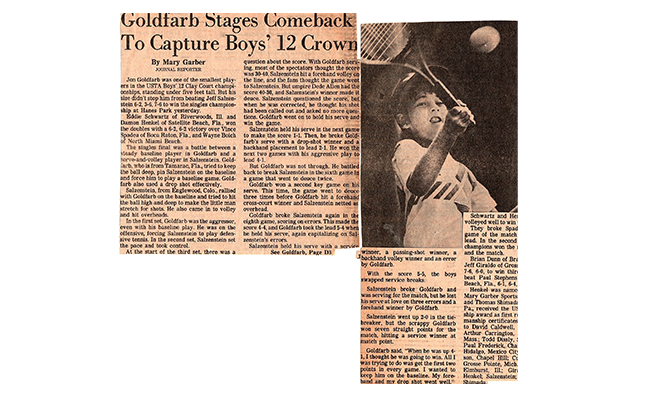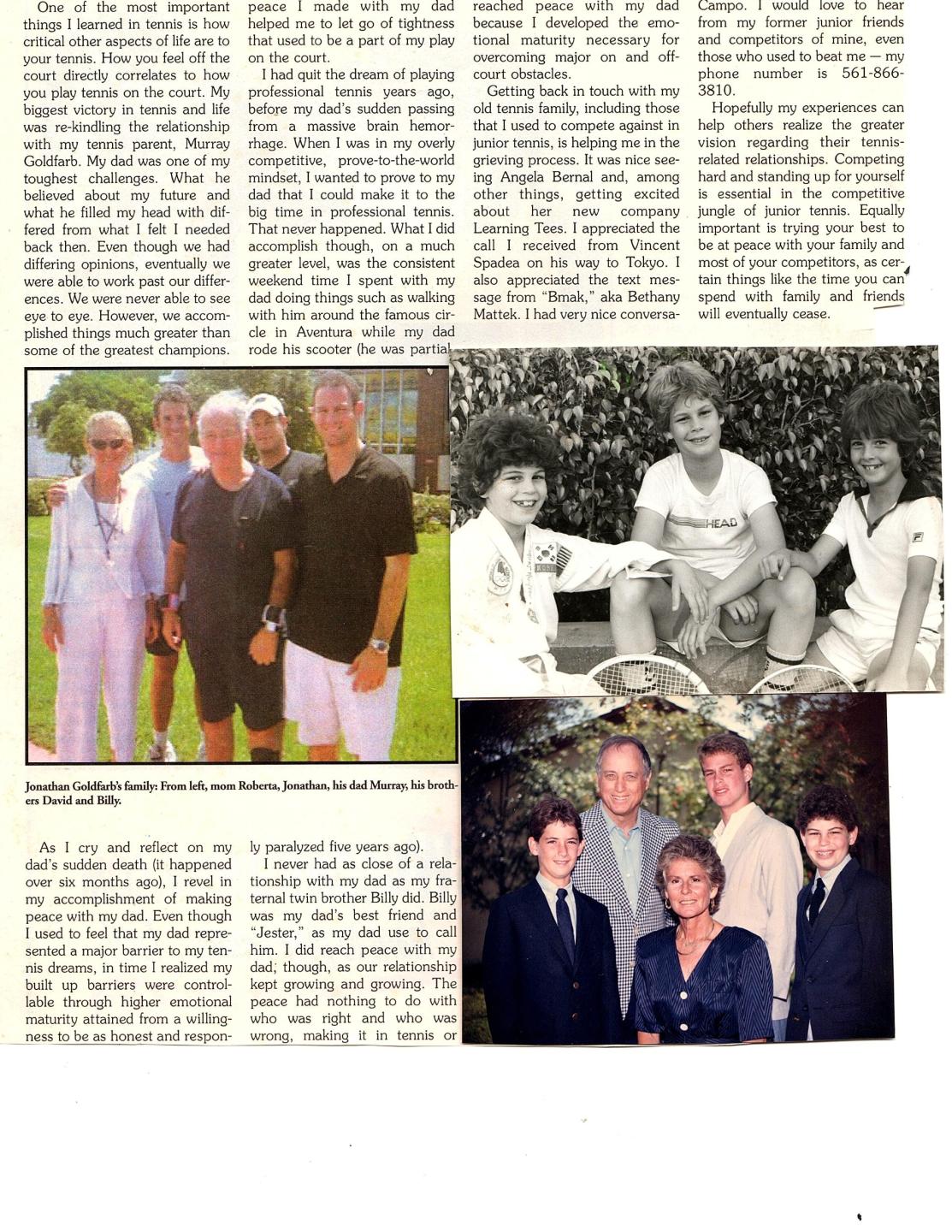BLOG
1- TennisVideos.com
This unique website (in the making) maximizes the demographics of all tennis players from the fan to the maximizer and those who know nothing but find it cool to check out or learn. Using videos for all things tennis, each category has its own separate theme and sub-themes. We are open to collaborations and partnerships. We are building our own content but for the most part for now extracting content from everywhere else. Since the site is all things video, we will consistently be updating the site with new videos.

2- Jonathan Goldfarb’s Background
At 12 years old in 1986, I, Jonathan Goldfarb, was the U.S. National Tennis Champion on clay courts. My friend/rival Vincent Spadea was the U.S. National Tennis Champion on hard courts that same year. Ten years later, I was near the bottom of the barrel on the ATP tour at number 968 in the world. Vince, that same year, was number 54 in the world on his way to wins over the world’s best, including Andre Agassi, Pete Sampras, and Roger Federer. Comparing Vince’s superior results next to mine pushed me to answer challenging questions such as: How come people with similar results early in their lives vary so much in accomplishments later in life? Where could I devote my talents, achieve new successes, and feel happy?
One main reason why some people attain greatness in their respected profession or craft stems from fortunate circumstances such as level of talent. However, the knowledge about what it takes to become a great teacher at something is not contingent on reaching greatness in one’s field. Due to the importance, I previously placed on the credential factor as a teacher, a difficult challenge for me was learning to let go of the idea that I personally needed to be one of the best tennis players in the world prior to reaching greatness as a professional tennis and life coach. In time, I learned how to judge myself based upon my progression from past to present. I also realized that if world renowned tennis coach Nick Bollettieri could become one of the greatest tennis teachers without ever playing competitive tennis, then my tennis results more than qualify me to be a great teacher.
My initial transition into the world away from professional tennis though created a brand, new set of challenges for which I was not initially prepared. Stepping away from old, comforting habits for the pursuit of new challenges was difficult for me. Despite maturing in many ways, it wasn’t easy for me to throw away my idealistic side. Could I have been one of the best tennis players in the world had I absorbed more wisdom around me? As much as I sought to answer questions pertaining to my highest potential in professional tennis, my mission of helping others in and out of tennis became much more important.
Thanks to tennis, I was given a full, four-year tennis scholarship to Rollins College, a beautiful school with a rich history. I traveled the world competing in tournaments. I developed healthy lifestyle habits necessary for on and off court success. My lifetime of experiences as a competitor, coach, mediator, and student of the game has allowed me to incorporate my beliefs into books which are finally at the ladder stages to publish. I look forward to sharing them with you and continuing this dialogue.

3- MY DAD’S LESSONS IN REALISM FOR ON & OFF COURT SUCCESS
My father was trying to instill the concept of practicality in me years ago. He knew the importance of structures and reasonable goals. At times, I felt though, as if my dad was pigeon-holing me into following structures that were too rigid for my potential. I wanted to think outside the box he was drawing for me. The challenge when trying to go beyond what others see for you is that there is no formula. If you do not produce what you believe is possible, then extreme realists will make you feel vulnerable. On the other hand, you will flow aimlessly as your failing results will prove, if you are being influenced too much by overly idealistic people, who encourage you to shoot for the stars without focusing on foundational goals in progressive ways.
My dad’s argument on the impossibility of making it big in tennis was difficult for me to accept because many people that I practiced with ended up making it such as Vince Spadea and Jennifer Capriati. Healthy dreaming provides hope, reason, and potential for success and happiness. Dreamers who are not in the process of building strong inner foundations though can lose touch with reality and develop addictive traits. I eventually became a much more practical thinker, as a result, of gradually maturing and subsequently heeding my dad’s advice even when it was difficult to take. These combined reasons helped me to bridge the gap between idealistic dreaming and realism.
Even though I will always dream, I have learned how to limit and balance it with pragmatic thought. The heartfelt article below about my dad, which I wrote in the April 2007 edition of Florida Tennis, examines my path to practicality. Idealistic visions are worthy to strive for, but you must be realistic regarding how to go about it. Attaining success with your craft goals and being more purposeful requires you to be efficient and work hard.
Unlike many tennis parents I grew up with (i.e., Mr. Spadea and Mr. Washington, fathers of former top 20 players in the world Vincent and Malivai), my dad was not the typical tennis parent. He realized the logical realities behind the benefits of tennis such as a college scholarship. Trying to improve and compete at higher levels was personally more challenging because my dad saw things in more structured ways. One of the many things I learned from sport is that ultimately you must know what you want and not let anything stand in your way. If you want to play professionally yet are not born into a family supporting your wishes, then you must be extremely mature and determined.
Through the years I worked with different experts including sports psychologists, therapists, and coaches. I eventually realized that making it in tennis was possible. It is difficult though when you are young, vulnerable, and your passion is not being unconditionally supported. Even though my dad was an obstacle with my tennis goals, I learned that you are the only person who can stop yourself from reaching your vision. Despite having stopped playing professional tennis, I kept competing and learning. My understanding about success is not due to reaching greatness on a tennis results level. I accomplished many of my goals and reached greatness in understanding because I was willing to learn from experts, experience life, take risk, and persevere past many on and off-court challenges.
One of the most important things I gained from tennis is the criticalness of other aspects of life. How you feel off the court directly correlates to your play on the court. One of my biggest victories in tennis and life was rekindling the relationship with my father, Murray Goldfarb. My dad used to be one of my biggest critics. What he believed about my future and what he was filling my head with differed from what I felt I needed. Despite our differing opinions, in time we worked past our differences. Like a democrat and republican though, we never were able to see eye to eye while I was playing professional tennis. However, we accomplished something even some of the greatest champions never do.
As I cry and reflect on my dad’s sudden death, I revel in my accomplishment of making peace with him. Previously, I believed that my dad represented a major barrier to my tennis dreams. However, I came to realize that my roadblocks were controllable through higher maturity, which requires being as honest and responsible as possible. The peace I made with my dad helped me to let go of tightness, which used to control my tennis.
I had quit the dream of professional tennis years ago before my dad’s sudden passing from a massive brain hemorrhage. When I was in my overly competitive, prove myself-to-the-world mindset, I wanted to show my dad that I could make it to the big leagues of professional tennis. That never happened. Thankfully though, I spent weekends together with my dad doing things such as walking with him while he rode his scooter around the popular Aventura circle.
Unfortunately, I never had a business relationship with my dad as my brother David or Billy who was my dad’s “jester” as our dad used to call him. Fortunately, I reached peace with my dad. Our harmony had nothing to do with who was right and who was wrong or the idealism of being best friends or making it in tennis. My relationship with my dad taught me to find ways to move beyond our differences or lose inside and out. There was no gray. There was no middle ground. I reached peace with my dad due to my increased maturity and realistic outlook.

